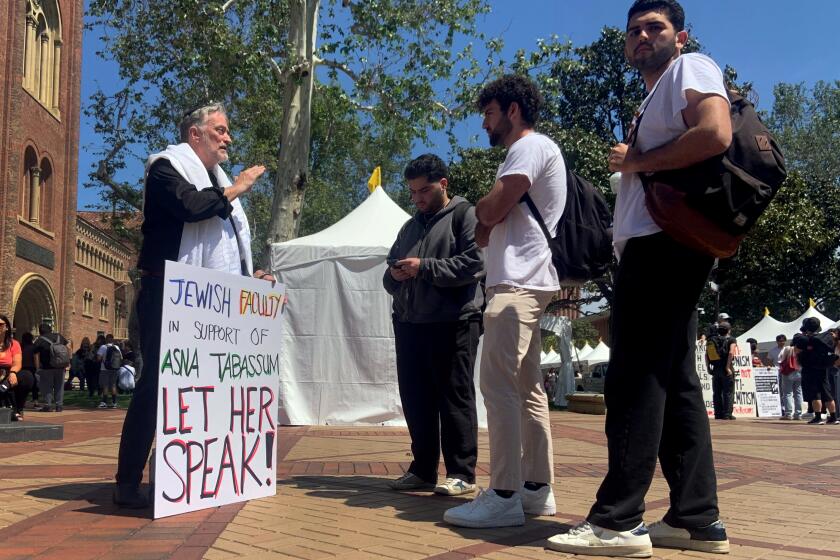A Startling Statistic at UCLA
This fall 4,852 freshmen are expected to enroll at UCLA, but only 96, or 2%, are African American -- the lowest figure in decades and a growing concern at the Westwood campus.
For several years, students, professors and administrators at UCLA have watched with discouragement as the numbers of black students declined. But the new figures, released this week, have shocked many on campus and prompted school leaders to declare the situation a crisis.
UCLA -- which boasts such storied black alumni as Jackie Robinson, Tom Bradley and Ralph Bunche, and is in a county that is 9.8% African American -- now has a lower percentage of black freshmen than either crosstown rival USC or UC Berkeley, the school often considered its top competitor within the UC system.
The 96 figure -- down by 20 students from last year -- is the lowest for incoming African American freshmen since at least 1973. And of the black freshmen who have indicated they will enroll in the fall, 20 are recruited athletes, admissions officials said.
“Clearly, we’re going to have to meet this crisis by redoubling our efforts, which have not yielded the results we’d like to see,” said Chancellor Albert Carnesale, who met Friday with a delegation of undergraduates upset about the situation.
In a telephone interview before the meeting, Carnesale described the preliminary numbers for black freshmen as “a great disappointment” and said that UCLA has been trying for years to boost those levels, within the limits allowed by law.
He and other officials at UCLA and elsewhere said the problem of attracting, admitting and enrolling qualified black students is found at competitive universities across the country and that its causes are complex. In California, the problem is rooted partly in the restrictions placed on the state’s public colleges and institutions by Proposition 209, the 1996 voter initiative that banned consideration of race and gender in admissions and hiring.
Other factors include the socioeconomic inequities that undermine elementary and high school education in California and elsewhere, with minority students disproportionately affected because they often attend schools with fewer resources, including less-qualified teachers and fewer counselors.
Many students and professors also say the declining presence of blacks on campus discourages some prospective students from attending, thus exacerbating the problem. Some of those interviewed, including UCLA sociologist Darnell Hunt, said the campus could be doing more than it is.
Hunt, who heads UCLA’s Bunche Center for African American Studies, and several colleagues have been studying the issue as part of a multiyear research project on the challenges facing black students in California universities.
In a draft of a report to be released this month, the researchers compared the admissions criteria and processes at UC’s three most competitive campuses: UCLA, UC Berkeley and UC San Diego. (At the latter, the incoming black freshman class stands at 52 students, or 1.1%, even lower than the others.)
The report found that UC San Diego’s admissions process relied most heavily on numbers, while UC Berkeley’s was most “holistic,” allowing a single reader to review all parts of an applicant’s file, including academic and personal achievements or challenges.
At UCLA, in what admissions officials have described as an attempt to increase fairness and objectivity, applicants’ files are divided by academic and personal areas, and read by separate reviewers. The researchers asserted that UC Berkeley’s process may be the fairest, because it allows students’ achievements to be seen in the context of their personal challenges.
In an interview, Hunt acknowledged the difficulty for a campus like UCLA, which received 47,000 applications this year. Yet he criticized the school for rejecting many black students based on what he described as factors of questionable validity, and that he said may be linked more to socioeconomic privilege than academic merit.
“There’s a common misperception that this is a horrible problem but that black students just need to do better,” he said. “But most of the black students who don’t get in go to other top-notch schools -- Harvard, Duke, Michigan. We’re losing students who could be here.”
Ward Connerly, the conservative former UC regent who was an architect of Proposition 209, countered that the issue was not the law he helped create.
“The problem -- and this is an old song, I know -- starts with the small number of black students who are academically competitive,” he said, pointing out that many also choose to attend historically black colleges or private schools. “But I don’t think we solve this problem by tinkering with the admissions criteria to make it easier to get in.”
No matter the cause, the effect is apparent on campus.
Karume James, 20, a graduating senior who led a recent student protest on campus over the issue, said he remembered the excitement he felt when he arrived at UCLA for student orientation in the summer of 2003.
Then just 17, James was preparing to transfer to the big-city campus from a community college in Riverside, his hometown. And he recalled what he felt when he looked around.
“That was a real shock. I spent about 14 hours at the campus, and I counted only about 12 black people. I guess I’d had this feeling that UCLA was going to be this truly diverse place, and it just wasn’t,” said James, who is now the chairman of UCLA’s Afrikan Student Union. “Not for black students.”
James, who was among half a dozen students who met Friday with Carnesale, called the session productive and said the UCLA chancellor was receptive to the group’s views. Carnesale, who is preparing to step down as chancellor this month, promised to release a statement expressing concern about the issue and work with alumni, students and others to raise the numbers.
The new figures were part of an annual report showing that a record-setting 37,000 freshmen plan to enroll at UC campuses in the fall. Overall, across all nine undergraduate campuses, the new class shows a continued trend of slight increases in black, Latino and Native American students. These groups, which are still considered underrepresented at UC, will make up just under 20% of the 2006 freshman class, compared with just below 19% for the current class.
But the picture in the latest release varied by campus and by group, with the underrepresented minority numbers at the system’s most competitive campuses -- UCLA and UC Berkeley -- drawing the most attention, as always.
At UC Berkeley, black, Latino and Native American students are expected to make up 15.9% of the freshman class, up from 14.4% this year. And 140 black students, 10 more than this year, have said they will enroll in the fall, making up 3.3% of the overall class of about 4,200. The number of Latino students also rose, from 449 to 509.
At UCLA, however, the numbers fell for both groups, and for the overall percentage of underrepresented students, despite an increase of more than 300 in the size of the total freshman class.
Of the freshmen who say they will enroll at UCLA this fall, 15.9% are from underrepresented groups, compared with 18.1% of the current freshman class. The figure for Latinos dropped from 683 to 659.
“The critical mass of our African American students is eroding, and we know the quality of our education experience is absolutely affected, as well as our obligation to the citizens of this state,” said Janina Montero, UCLA’s vice chancellor for student affairs.
Jenny Wood, UCLA student body president, belongs to a student committee drafting recommendations to revamp the admissions process.
“I think it’s been really detrimental to see this decline in African American students and, overall, in the number of students of color on our campus,” she said.
In Los Angeles County, blacks accounted for 11%, or 9,152, of the 84,677 public high school graduates. Statewide, blacks made up 7%, or 25,267, of the 343,481 students who graduated from California’s public high schools in 2004, the most recent year statistics are available.
*
(BEGIN TEXT OF INFOBOX)
Shortage of black freshmen
Ethnic and racial breakdown of UCLA freshmen*
1985 (peak year for black enrollment)
White: 49.7%
Asian/Filipino: 22.2%
Chicano/Latino: 14.8%
Black: 9.6%
Other**: 3.7%
--
2005
White: 33.3%
Asian/Filipino: 41.0%
Chicano/Latino: 14.8%
Black: 2.9%
Other**: 7.9%
Pie charts may not add up to 100% due to rounding.
*Excludes foreign students. **Includes Native Americans, other groups and those who declined to state.
Source: UCLA
*
Times staff writers Stuart Silverstein and Lynn Doan contributed to this report.
More to Read
Start your day right
Sign up for Essential California for news, features and recommendations from the L.A. Times and beyond in your inbox six days a week.
You may occasionally receive promotional content from the Los Angeles Times.






